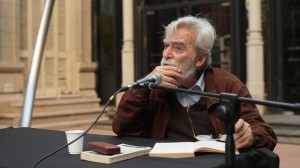1. Mirror Trick
Of course I know her.
She is one and many,
A multitude flashing on, then
Blinking off—on, off—
Watching out from the tidy blank
of her face. She is silent, speaking
With just her mind. She is flesh, a form,
but also flat, a mute screen.
What she offers you, by no means
Should you accept. She belongs to no-one,
sitting like a ghost beyond her own reach.
And yet, she’s there—I mean me—
Behind glass, as if the world has been cleaved,
Though something whole remains,
Roving, free, a voice with poise and pitch.
She’s there—me—snug in the glass,
The little mirror on the bedside
Doing its one trick
A hundred times a day.
You didn’t come to live with me.
2. Turkish Bath
The room is choked with nudes.
Once, a man barged in by mistake
Crying, “Turkish bath!” He had no idea
My door is always locked in this heat,
No idea that I am the sole guest and client,
The chief consort, that I cast my gaze
Of pity and absolute pride across
The length of my limbs—lithe, pristine—
The bells of my breasts singing,
The high bright note of my ass,
My shoulders a warm chord
The chorus of muscle that rings
Ecstatic. I am my own model.
I create, am created, my bed
Is heaped with photo albums,
Socks and slips scatted on a table.
A spray of winter jasmine wilts
In its glass vase, dim yellow, like
Despondent gold. Blossoms carpet
The floor, which is a patchwork
Of pillows. Pick a corner sleep in peace.
You didn’t come to live with me.
3. Curtain Habit
The curtain seals out the day.
Better that way to let my mind
See what it sees (every evil under the sun),
Or to kneel before the heart, quiet king,
Feeling brave and consummately free.
Better that way to let all that I want
And all I believe swarm me like bees,
Or ghosts, or a cloud of smoke someone
Blows, beckoning. I come. I cry out
In release. I give birth
To a battery of clever babies—triplets,
Quintuplets, so many all at once.
The curtain seals in my joy.
The curtain holds the razor out of reach,
Puts the pills on a shelf out of sight.
The curtain snuffs shut and I bask in the bounty
Of being alive. The music begins.
Love pools in every corner.
You didn’t come to live with me.
4. Self-Portrait
The camera snaps. Spits me out starkly ugly.
So I set out to paint the self within myself.
It took twelve tubes, blended to a living tint,
Before I believed me. I named the mixture Color P.
The hair—curious, unlikely—is my favorite,
The same fluff of bangs tickling my niece’s face.
And my eyebrows are wide as hills. They swallow everything.
They were a feat. They do not impress me as likely to age.
They are brimming with wisdom. Neither slavish nor stern.
Not magnificent, but not the kind made to crumple in shame.
Not prudish. Unwilling to arch and beckon like a whore’s.
They skitter away from certainties like alive or dead.
My self-portrait hangs on the narrow wall,
And I kneel down to it every day.
You didn’t come to live with me.
5. Impromptu Party
The little table is draped with a festive cloth, and
Light blurs out from a single lamp, making us fuzzy.
A sip of red wine, and I rise to my feet. We are
Dancing, my guests and I, like kids in a ballroom.
We don’t smile or even speak. We’ve had a lot to drink.
To a single woman, time is like a scrap of meat:
Nothing you can afford to give away. I want
To hold it in my lap, Time, that sneak, that thief already
Scheming to break free. Please—I beg
Upon the magnificent extravagance of my beloved stilettos,
I want the world back. I’ve been alive—could it be?—
Near a century. My face has closed up shop.
My feet are a desolate country.
For a single woman, youth is a feast that lasts
Only until it is gone.
You didn’t come to live with me.
6. Invitation
When it arrived, I was interrupted by relief,
Sitting in my rattan chair, feeling the wind ease in
Through the hole in my life.
I only said yes because of his dissertation. Friends,
Nothing more. We talked—he talked—about modernism,
Black humor. But always at a distance from reality.
Why didn’t he ask anything of me?
Tender and petulant, he struck me as cute.
But at heart, only a very well-behaved boy.
He offers his arm. Elegant, decent, gallant.
But how can I prove myself a woman
If he is a child? What can come of that union?
Can any of us save ourselves? Save another?
You didn’t come to live with me.
7. Sunday Alone
I don’t picnic on Sundays.
Parks are a sad song; I steer clear.
But I dug out all my sheet music,
I lolled about in the Turkish Bath
Singing from breakfast to tea.
With my hair, I sang Do
And my eyes, Re
And my ear sounded Mi
And my nose went after Fa
My face tilted back and out rose Sol
My mouth breathed La
My whole body birthed Si
Like my cousin said, famously—
Music is the soul sighing.
Music pushes back against pain.
Solitude is great (but I don’t want
Greatness). My eyes slump
Against the walls. My hair
Hurls itself at the ceiling like a colony
Of bats.
You didn’t come to live with me.
8. Dialectic
I read materialist philosophy—
Material ispeerless.
But I’m creationless.
I don’t even procreate.
What use does the world have for me
Here beside my reams of cock-eyed drafts
That nick away at the mountain of
Art and philosophy?
Firstly, Existentialism.
Secondly, Dadaism.
Thirdly, Positivism.
Lastly, Surrealism.
Mostly, I think people live
For the sake of living.
Is living a feat?
What will last?
My chief function is obsolescence.
Still, I send out my stubborn breath
In every direction. I am determined
To commit myself to a marriage
Of connivance.
You didn’t come to live with me.
9. Downpour
Rain hacks at the earth like an insatiable man.
Disquiet, like passion, subsides instantly.
Six distinct desires mate, are later married.
At the moment, I want everything and nothing.
The rainstorm barricaded all the roads. Sandbags.
Isn’t there something gladdening about a dead-end?
I canceled my plans, my trysts, my escapes.
For a moment—I almost blinked and missed it—the storm
Stopped the clock that chases me. The clock of the heart, maybe.
It was an ecstasy so profound…
“Ah, linger on, thou art so fair!”
I’d rather admit despair. And die.
You didn’t come to live with me.
10. Dream of Symbolism
I occupy the walls that surround me.
When did I become so rectilinear?
I had a rectilinear dream:
The rectilinear sky in Leo:
The head, for a while, shone brightest.
Next the tail. After a while
It became a wild horse
Galloping into the distances of the universe,
Lasso dragging behind, tethered to nothing.
There are no roads in the black night that contains us.
Every step is a step into absence.
I don’t remember the last time I saw
A free soul. If she still exists, fire-eyed gypsy,
She’ll die young.
You didn’t come to live with me.
11. Birthday Candles
They are like heaps of stars.
My flat roof is like a private galaxy
That stretches on stubbornly forever.
The universe created us by chance,
Our birth a tidy accident.
Should life be cherished or lavished?
Showered with confetti or pelted with rocks?
God announces: Happy Birthday.
Everyone raises a glass and giggles audibly.
Death gets clearer in the distance. Closer by a year.
Because all are afraid, none is afraid.
It’s pity how fast youth sputters and burns,
Its flame like the season’s last peony.
A bright misery.
You didn’t come to live with me.
12. Cigarette
I lift it to my lips, supremely slim,
Igniting my desire to be a woman.
I appreciate the grace of the gesture,
Cosmopolitan, a shorthand for beauty,
The winding haze off the tip like the chaos of sex.
Loneliness can be sweet. I re-read the paper.
The ban on smoking underway
Has gotten a bonfire of support. A heated topic,
Though I find it inflammatory. A sputtering drag.
A contest between low-lives and sophisticates,
Though only time knows which is which.
Tonight I want to commit a victimless crime.
You didn’t come to live with me.
13. Thinking
I spend all my spare time doing it.
I give it a name: walking indoors.
I imagine my life is a melodrama
In which I possess all that I lack.
I flesh-out storylines. What never
Happens becomes a waking dream,
The kind that gets revealed at season’s end.
It’s impossible to think of everything.
Thinking of what I am afraid to say
Keeps my better judgment at bay.
I lose track. I look up, allowing thoughts
To collect. It is like having a garage
Full of props from a period movie.
It is like a republic with exacting rules
Regarding departure and re-entry. My visa’s
In-process. I want to settle, though like anyone,
I worry it’s overpopulated already.
You didn’t come to live with me.
14. Hope
This city of riches has fallen empty.
Small rooms like mine are easy to breech. People
Have taken to bodyguards, guardians. Still,
I come and go, always alone, fat with fear.
My flesh has forsaken itself.
Strangers’ eyes drill into me till I bleed.
I beg God: make me a ghost.
Something invisible blockades every road.
I wait for you night after night with a hope beyond hope.
If you come, will nation rise up against nation?
If you come, with the Yellow River drown its banks?
If you come, will the sky blacken and bleed?
Will your coming decimate the harvest?
There is nothing I can do in the face of all I hate.
What I hate most is the woman I’ve become.
You didn’t come to live with me.
translated from Chinese by Changtai Bi & Tracy K. Smith





 Two poems by Juan Carlos Mestre translated by Patrick Marion Bradley.
Two poems by Juan Carlos Mestre translated by Patrick Marion Bradley. 






